Jeanine Cummins Famous Quotes
Reading Jeanine Cummins quotes, download and share images of famous quotes by Jeanine Cummins. Righ click to see or save pictures of Jeanine Cummins quotes that you can use as your wallpaper for free.
Bookstores, invariably, are a refuge. There's one in the town where they live, and the first time Lydia ventures in, it takes her breath away. She has to steady herself against a shelf. The smell of coffee and paper and ink. It's nothing like her little shop back home. It's stocked mostly with religious books, and instead of calendars and toys, they carry rosaries, Buddha figurines, yarmulkes. Still, the upright spines of the books are bedrock. Steady. There's an international poetry section. Hafiz. Heaney. Neruda. Lydia flips past the twenty love poems and reads "The Song of Despair." She reads it desperately, hungrily, bent over the books in the aisle of the quiet shop. Her fingers ready the next page while she devours the words. The book is water in the desert.
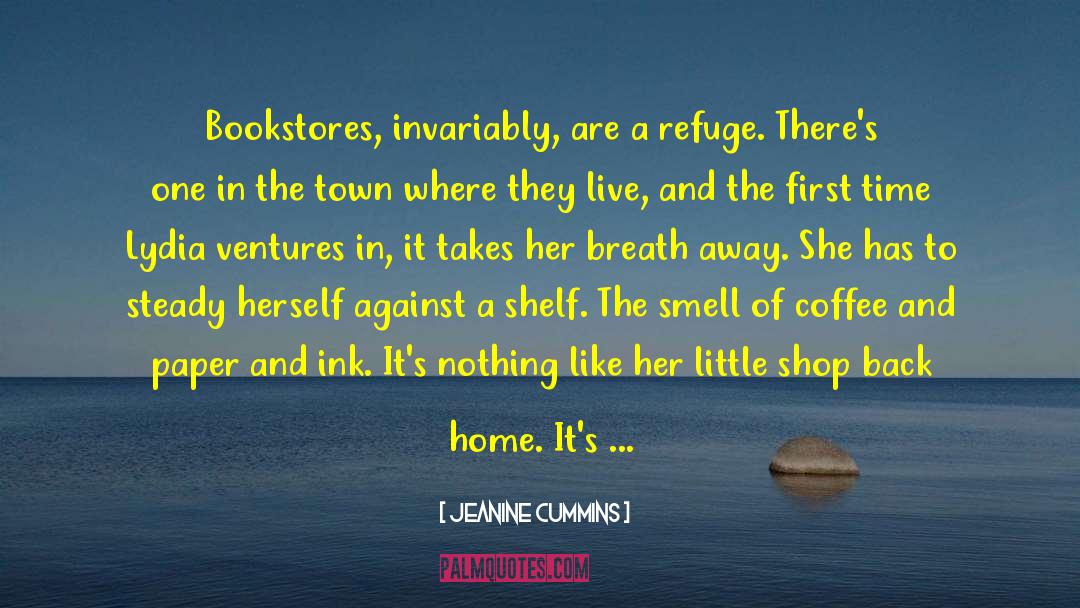
Someone once told me that the only good advice for grief is to stay hydrated. Because everything else is just chingaderas.
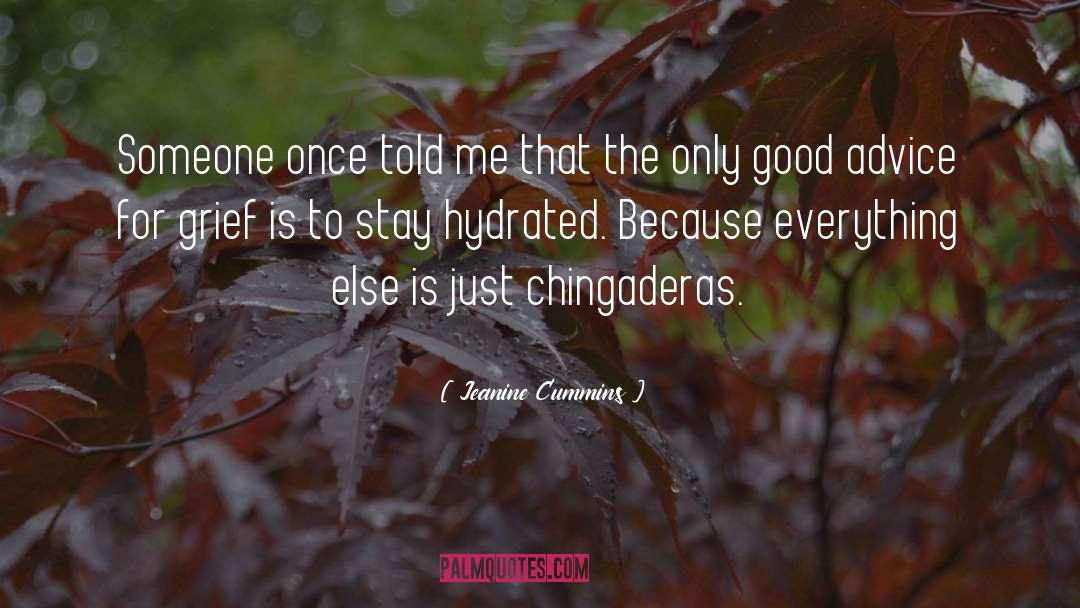
He seemed enlightened. But like every drug lord who's ever risen to such a rank, he was also shrewd, merciless, and ultimately delusional. He was a vicious mass murderer who mistook himself for a gentleman. A thug who fancied himself a poet.
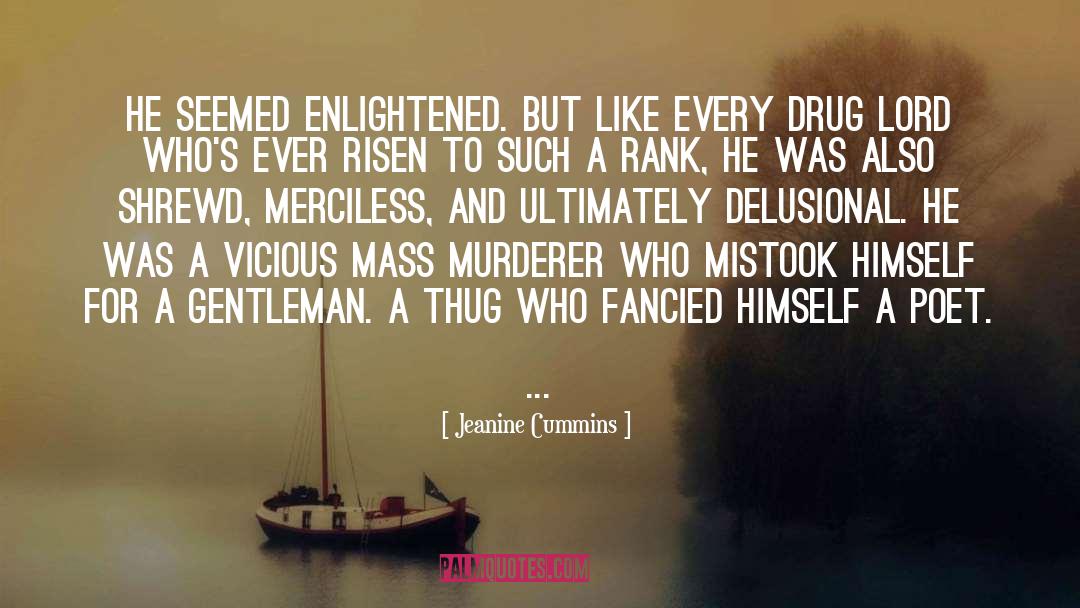
It was like a vault , this house, but still you got the impression it could, with a great deal of effort, and only if you made it very angry, lift itself off its manicured haunches and chase after you at a terrible pace. That it could overtake you and chase after you at a terrible pace. That it could overtake you and pin you down by the shirttail, and then it could carefully lower itself right back down, all the vast weight of its ancient rock-heaps and stones bearing down on top of you, crushing you - Outside boy pg.306
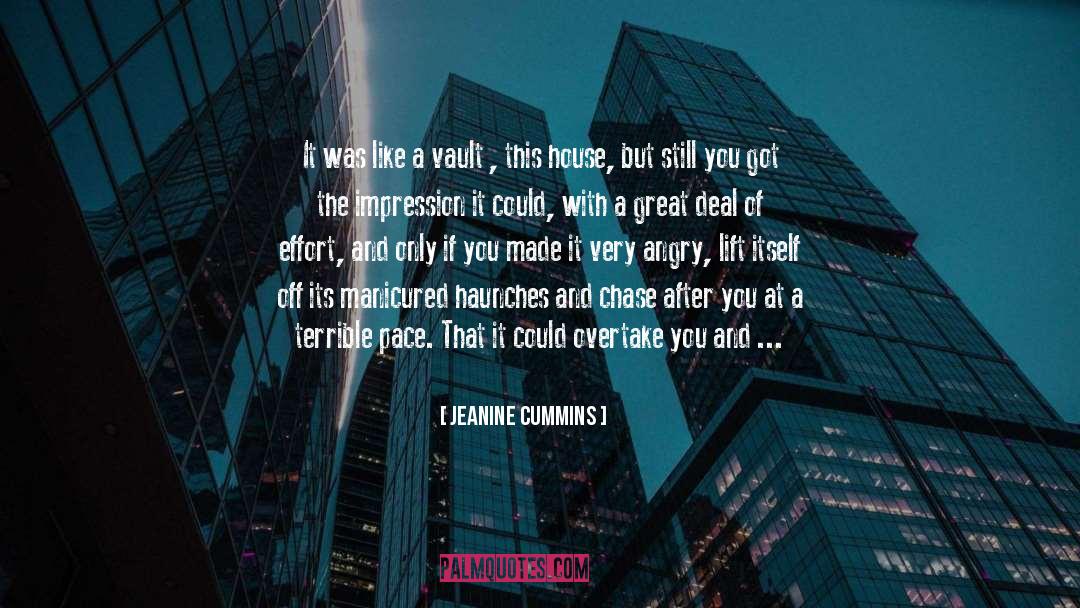
[Author's Note:] When my grandmother came to the United States from Puerto Rico in the 1940s, she was a beautiful, glamorous woman from a wealthy family in the capital city, and the young bride of a dashing naval officer. She expected to be received as such. Instead, she found that people here had a very reductionist view of what it meant to be Puerto Rican, of what it meant to be Latinx. Everything about her confused her new neighbors: her skin tone, her hair, her accent, her notions. She wasn't what they expected a boricua to be.
My grandmother spent much of her adult life in the States but didn't always feel welcome here. She resented the perpetual gringo misconceptions about her. She never got past that resentment, and the echoes of her indignation still have some peculiar manifestations in my family today. One of the symptoms is me. Always raging against a perceived slight, always fighting against ignorance in mainstream ideas about ethnicity and culture. I'm acutely aware that the people coming to our southern border are not one faceless brown mass but singular individuals, with stories and backgrounds and reasons for coming that are unique. I feel this awareness in my spine, in my DNA.
So I hoped to present one of those unique personal stories - a work of fiction - as a way to honor the hundreds of thousands of stories we may never get to hear. And in so doing, I hope to create a pause where the reader may begin to individuate. When we see migrant
![Jeanine Cummins Quotes: [Author's Note:] When my grandmother Jeanine Cummins Quotes: [Author's Note:] When my grandmother](https://palmquotes.com/author/jeanine-cummins-quotes-1027278.jpg)
Luca feels unmoored from the boundaries of time that have always existed.
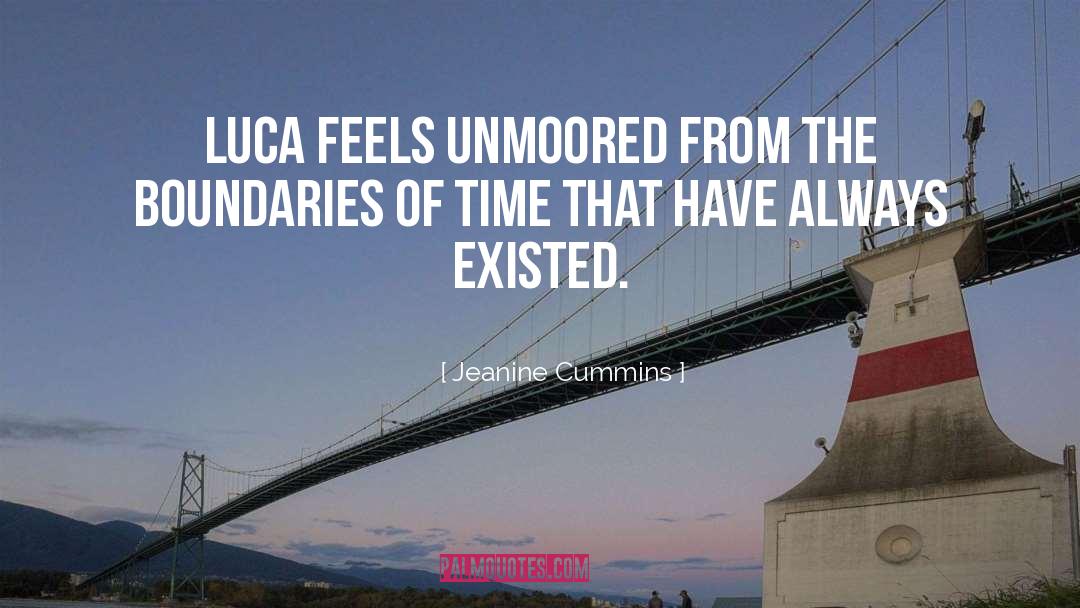
They hike almost three miles without incident, and it's amazing to watch the colors leach back into the desert after the day's blanching. There's a moment, Lydia realizes, or no, more than a moment - a span of perhaps fifteen minutes just at twilight - when the desert is the most perfect place that exists. The temperature, the light, the colors, all hang and linger at some unflawed precipice, like the cars of a roller coaster ticking ever so slowly over their apex before the crash. The light droops ever farther from the sky, and Lydia can smell the heat of the day wicking away from her skin.
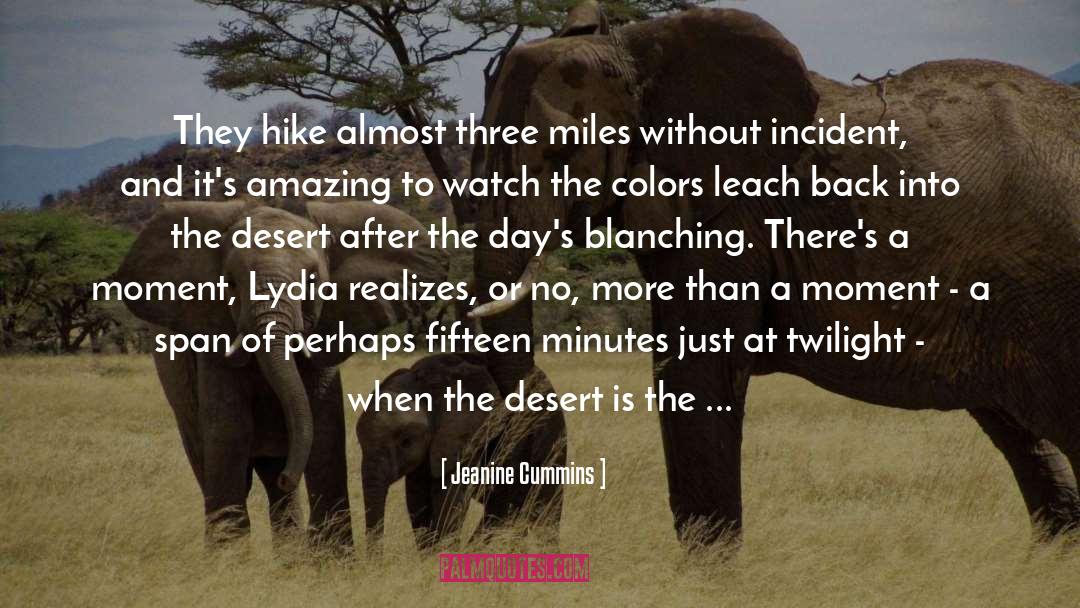
[Author's note:] When I decided to write this book, I worried that my privilege would make me blind to certain truths, that I would get things wrong, as I may well have. I worried that, as a non-immigrant and non-Mexican, I had no business writing a book set almost entirely in Mexico, set entirely among migrants. I wished someone slightly browner than me would write it. But then I thought, 'If you're a person who has the capacity to be a bridge, why not be a bridge?' So I began.
In the early days of my research, before I'd fully convinced myself that I should undertake the telling of this story, I was interviewing a very generous scholar, a remarkable woman who was chair of the Chicana and Chicano studies Department at San Diego State University. Her name is Norma Iglesias Prieto, and I mentioned my doubts to her. I told her I felt compelled, but unqualified, to write this book. She said, "Jeanine. We need as many voices as we can get, telling this story." Her encouragement sustained me for the next four years.
I was careful and deliberate in my research. I traveled extensively on both sides of the border and learned as much as I could about Mexico and migrants, about people living throughout the borderlands. The statistics in this book are all true, and though I changed some names, most of the places are real, too. But the characters, while representative of the folks I met during my travels, are fictional.
![Jeanine Cummins Quotes: [Author's note:] When I decided Jeanine Cummins Quotes: [Author's note:] When I decided](https://palmquotes.com/author/jeanine-cummins-quotes-1170786.jpg)
Lydia can't see it from the dark place where she is, but she can sense it. She knows that it's the perfect time of day out there in the desert. She imagines the colors making a show of themselves outside. The glittering gray pavement, the aching red land. The colors streaking flamboyantly across the sky. When she closes her eyes, she can see them, the paint in the firmament. Dazzling. Purple, yellow, orange, pink, and blue. She can see those perfect colors, hot and bright, a feathered headdress. Beneath, the landscape stretches out its arms.
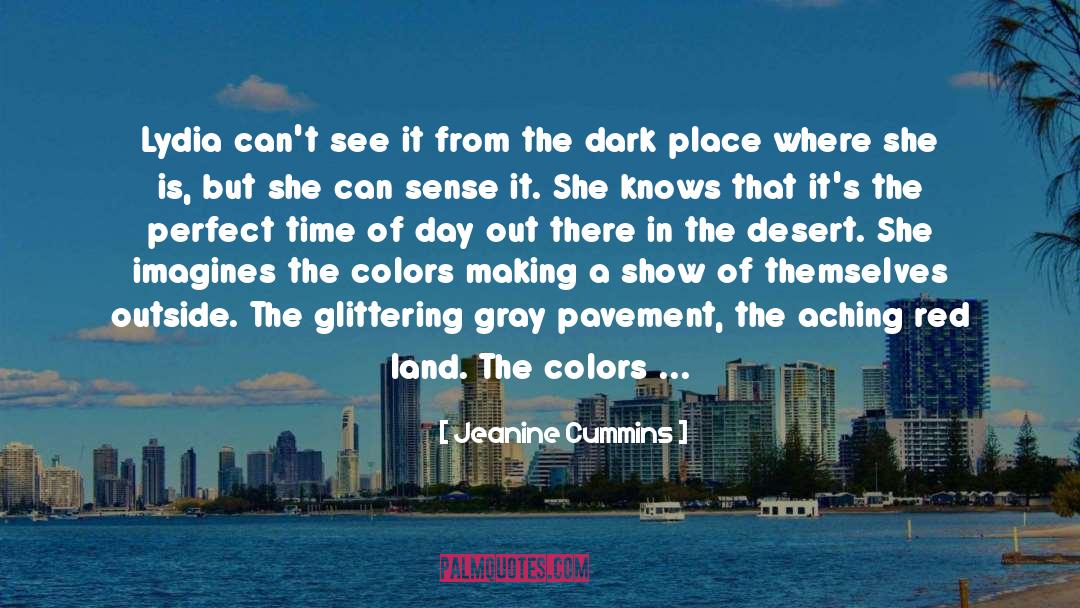
[Author's Note:] When I was sixteen, two of my cousins were brutally raped by four strangers and thrown off a bridge in St. Louis, Missouri. My brother was beaten and also forced off the bridge. I wrote about that horrible crime in my first book, my memoir, A Rip in Heaven. Because that crime and the subsequent writing of the book were both formative experience in my life, I became a person who is always, automatically, more interested in stories about victims than perpetrators. I'm interested in characters who suffer inconceivable hardship, in people who manage to triumph over extraordinary trauma. Characters like Lydia and Soledad. I'm less interested in the violent, macho stories of gangsters and law enforcement. Or in any case, I think the world has enough stories like those. Some fiction set in the world of the cartels and narcotraficantes is compelling and important - I read much of it during my early research. Those novels provide readers with an understanding of the origins of the some of the violence to our south. But the depiction of that violence can feed into some of the worst stereotypes about Mexico. So I saw an opening for a novel that would press a little more intimately into those stories, to imagine people on the flip side of that prevailing narrative. Regular people like me. How would I manage if I lived in a place that began to collapse around me? If my children were in danger, how far would I go to save them? I wanted to write about women, whose stories a
![Jeanine Cummins Quotes: [Author's Note:] When I was Jeanine Cummins Quotes: [Author's Note:] When I was](https://palmquotes.com/author/jeanine-cummins-quotes-319594.jpg)
Lydia is constantly reminded that her education has no purchase here, that she has no access to the kind of information that has real currency on this journey. Among migrants, everyone knows more than she does. How do you find a coyote, make sure he's reputable, pay for your crossing, all without getting ripped off?
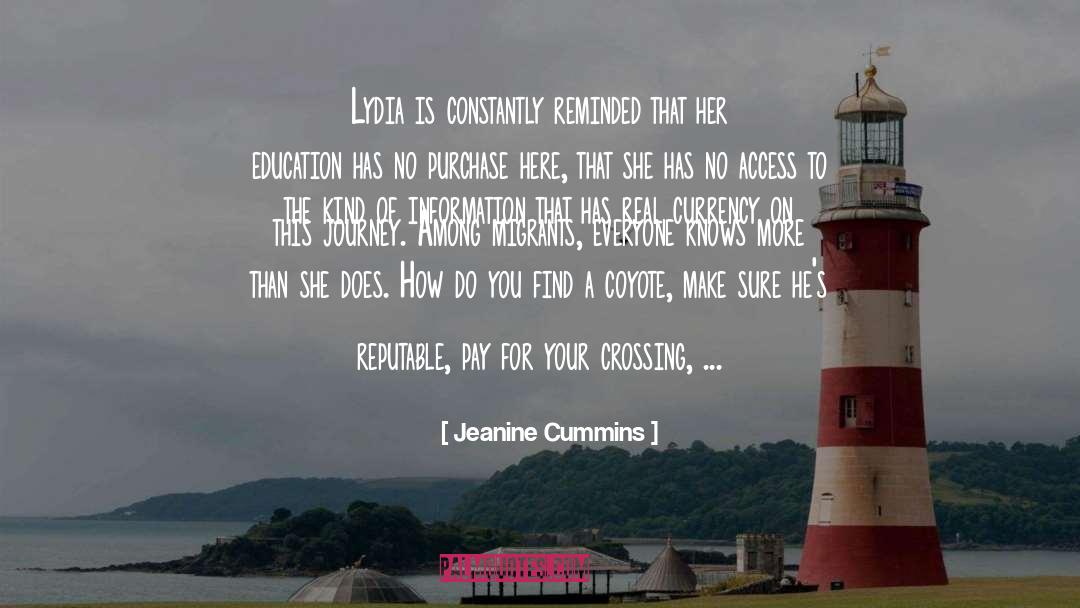
[Author's Note:] It took me four years to research and write this novel, so I began long before talk about migrant caravans and building a wall entered the national zeitgeist. But even then I was frustrated by the tenor of the public discourse surrounding immigration in this country. The conversation always seemed to turn around policy issues, to the absolute exclusion of moral or humanitarian concerns. I was appalled at the way Latino migrants, even five years ago - and it has gotten exponentially worse since then - were characterized within that public discourse. At worst, we perceive them as an invading mob of resource-draining criminals, and at best, a sort of helpless, impoverished, faceless brown mass, clamoring for help at our doorstep. We seldom think of them as our fellow human beings. People with the agency to make their own decisions, people who can contribute to their own bright futures, and to ours, as so many generations of oft-reviled immigrants have done before them.
![Jeanine Cummins Quotes: [Author's Note:] It took me Jeanine Cummins Quotes: [Author's Note:] It took me](https://palmquotes.com/author/jeanine-cummins-quotes-1290235.jpg)
